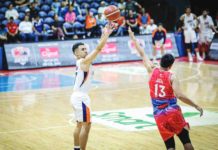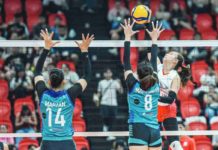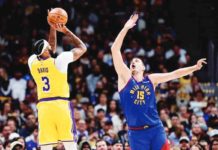
[av_one_full first min_height=” vertical_alignment=” space=” custom_margin=” margin=’0px’ padding=’0px’ border=” border_color=” radius=’0px’ background_color=” src=” background_position=’top left’ background_repeat=’no-repeat’ animation=”]
[av_heading heading=’FEEL THE GAME BOBBY MOTUS Is PBA still PBA?’ tag=’h3′ style=’blockquote modern-quote’ size=’30’ subheading_active=’subheading_below’ subheading_size=’15’ padding=’10’ color=” custom_font=” av-medium-font-size-title=” av-small-font-size-title=” av-mini-font-size-title=” av-medium-font-size=” av-small-font-size=” av-mini-font-size=” admin_preview_bg=”][/av_heading]
[av_textblock size=” font_color=” color=” av-medium-font-size=” av-small-font-size=” av-mini-font-size=” admin_preview_bg=”]
Thursday, November 9, 2017
[/av_textblock]
[av_textblock size=’18’ font_color=” color=” av-medium-font-size=” av-small-font-size=” av-mini-font-size=” admin_preview_bg=”]
THE Philippine Basketball Association was born in 1975 when nine teams in the defunct Manila Industrial and Commercial Athletic Association broke away from the clutches of the BAP-controlled amateur league. Team owners were not in favor of the BAP’s practice of getting their players for the national team without prior consultation.
U/Tex, Concepcion Industries, Mariwasa, Crispa, Royal Tru-Orange, 7-Up, Tanduay, Toyota, and Presto Ice Cream were the league pioneers and undersized centers like Manny Paner, Jimmy Mariano, Rudy Kutch, and Alberto Reynoso were having their ways against upcoming big men Mon Fernandez and Abet Guidaben. Although it was a Crispa-Toyota domain for the next 10 years, Mariwasa-Honda, Royal Tru-Orange and U/Tex managed to change the championship monopoly.
The mid-80s saw the rise of the Presto/Great Taste franchise when they had Ricardo Brown and Manny Victorino, then considered as one of the top three centers of the PBA along with Fernandez and Guidaben. Between 1984 and 1990, the franchise won six titles, the last one behind Allan Caidic, Gerald Esplana and 1990 top pick Apet Jao. The Purefoods era began in the 90s with the entry of Jerry Codinera, Jojo Lastimosa, Alvin Patrimonio, and Glen Capacio. The franchise now known as Star Hotshots had won 13 titles.
There were notable bigs from the late 80s to the early 90s like Codinera, Benjie Paras (Shell), Bonel Balingit (Swift), Jun Limpot, and Dennis Espino (Sta. Lucia), and EJ Feihl (Ginebra). Feihl, despite standing 7-foot-1, was a flop, to put it mildly. Before the 90s ended, brothers Andy and Danny Seigle, Ali Peek, Eric Menk, and Asi Taulava tested the brawn of homegrown bigs Cris Bolado, Wilmer Ong, Marlou Aquino, and Danny Ildefonso.
The new millennium entered and Asia’s first professional basketball league had become of late, a sub-kingdom of two of the country’s top corporations, fielding three teams each. Half of the 12-team pro league belongs to the SMC- and MVP-led groups. The other six teams belong to different enterprises. When the 2017 Governors’ Cup ended – surprise, surprise! – the top six spots were monopolized by the two corporations.
The league floundered and swam through countless issues since its inception and the sitting honcho that we have now is practically a controversy factory. Since his reign, Chito Narvasa has banned a sportswriter from covering PBA games, quarreled with an import and a Cebuano hotshot, and suspended referees for a crucial non-call that resulted to a loss of his close friend’s team. The same friend, who’s a team official, was seen on national TV vaping courtside, drawing criticism, but the friend was given just a gentle tap on the wrist. No need to talk about his latest genius act.
Reports now say that the PBA board, during a recent special meeting, passed a resolution that will not support the renewal of his contract at the end of the league’s 42nd season. So until the 43rd season opens, we’ll expect some more drama from the commissioner as he cannot be simply kicked out as removing him needs a two-thirds majority vote, meaning eight members.
The SMC group had pulled a superpower move. Now, they’re against the removal of Narvasa, citing technicalities and procedural lapses. Additionally this act, they said, could weaken the commissioner’s office as whoever sits can be manipulated. Are these people snorting something? They’re the puppet masters, as removing him will shift the balance of power to the MVP group. And what would prevent them from doing the same, as in I-can-do-better-than-you kind of thing? They could make a repeat of the 2015 Troy Rosario deal and swap Kia’s 2019 top pick for a bunch of bench residents.
Kia’s blunder was confusingly justified as “position-less basketball” by a team official. Of all my years following the sport, this is completely alien. Let’s face it – Kia’s basketball existence, with all their sublimely glorious transactions, defines weakling at its finest. So, what exactly is this crap?
In my limited understanding of team administration, figuratively, this position-less b-ball is something like making a puppet out of a team and letting the powers-that-be pull the strings. Literally, why oh why would you intend to put up a team with players having no definite playing positions? They’ll be like cockroaches scampering in all directions. Because they’re adapting this kind of ball, naming the team after their vehicle models would be an injustice to the well-performing four-wheelers. How does Kia Jellyfishes sound?/PN
[/av_textblock]
[/av_one_full]



